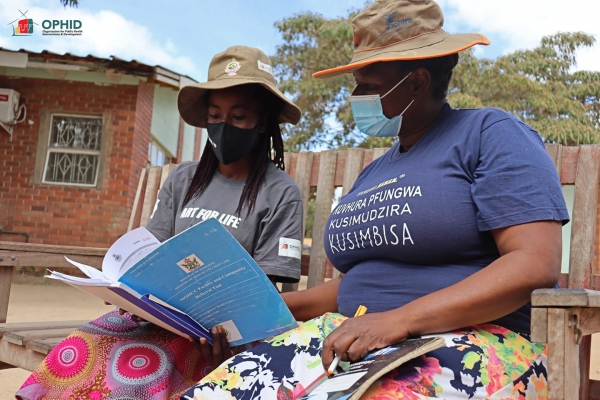People living with HIV (PLHIV) are more than twice as likely to experience a mental disorder than those without HIV. For this reason, Ministry of Health and Child Care in Zimbabwe recommends mental health screening for people living with HIV during their annual HIV clinical care review. However, nationwide, there has been no routine documentation of coverage or outcomes of recommended mental health screening in HIV care.
From January 2021, Organization of Public Health Interventions and Development (OPHID), in collaboration with the Friendship Bench, and the Zimbabwe Ministry of Health and Child Care (MOHCC) have implemented a pilot intervention integrating mental health screening and referral in routine HIV care. The pilot was implemented in 6 clinics in Chitungwiza. Clients receiving routine consultations or household visits, all HIV-positive clients were screened using a standard Patient Health Questionnaire (PHQ-2) tool for common mental disorders (CMDs). Clients who screen positive were referred to grandmothers (trained lay counsellors) from the Friendship Bench. The counsellors receive the clients and conduct a further screening using the national SSQ (Shona Symptoms Questionnaire) and clients with a score of 9 and above receive sessions of problem- based therapy and counselling.
Over 11 000 clients in HIV care were screened for common mental disorders during the learning period and 83% of those who screened positive have received therapy from the Friendship bench. The collaboration makes mental health services more accessible to people living with HIV. During March to May 2021 a total of 409 clients who screened positive were referred to FB for counselling and support from both community and facility level.
Tinashe’s story
Tinashe Seke (not real name), a male client aged 34 years and living with HIV for 15 years was supported by Nokuthula, an OPHID-supported community outreach agent (COA) and Mbuya Rambire, a grandmother with Friendship Bench at Seke South Clinic, Chitungwiza. His story demonstrates the impact the intervention can have. Tinashe Seke defaulted on his treatment and was being followed up by the COAs. When he was visited by the COA, they used the Patient Health Questionnaire (PHQ-2) tool to assess his mental health Tinashe expressed suicidal ideas due to the stigma,he was facing due to his HIV status.
“The people I lived with kept my utensils separate from others, no one would use the cup I used. I was treated as though I was nothing. I have no family, no children. I decided that it was not necessary for me to keep drinking tablets as I was like a person who was already dead”.
Tinashe was encouraged to visit the health facility for a viral load test. It was found that his viral load was high, and he was switched to second line ART treatment. He was then referred to the Friendship Bench for additional counselling and problem-based therapy.
The Friendship bench intervention
A Friendship Bench grandmother - Mbuya Rambire, received Tinashe following his referral. He underwent enhanced adherence counselling (EAC) at the facility and had four sessions of counselling with the Friendship Bench. He now has a good relationship with the Friendship Bench Grandmother.
“I went for counselling with Mbuya Rambire and she taught me the importance of adhering to treatment. I started taking my medicines correctly and now I am at TND (target not detected). Even the thoughts, I had to kill myself are no longer there. I want to live and work, as the problem I am facing now is lack of food. My body is in pain, and I can no longer do the work I used to do, carrying people’s luggage in a cart.”
Mbuya Rambire shared her experience with Tinashe.
“There is change in Tinashe’s life. By looking at him, you can tell that his mind is at ease. When I first met him, he wanted to kill himself and even had the poison with him. Now he is thinking about the future.He thinks about getting better so that he can work with his own hands. He is now adhering to treatment and his viral load is undetectable.”
Tinashe will be enrolled in Circle Kubatana Tose (CKT) where he will be trained in gardening and receive additional psycho-social support.
The value of collaboration
Mbuya Rambire said “Our work has become easier because of the collaboration. We used to mobilise clients by ourselves in the community but now, the COAs are now bringing clients to us. We now have more time to concentrate on counselling. They refer clients to us both in the community and in the facility.”
The client receives follow up support from both the OPHID COA and the grandmother. The collaboration also promotes exchange of knowledge between the OPHID and the Friendship Bench.
“I am now more aware of the mental health issues that affect PLWHIA. I now know some things that I did not know about mental health that when a person faces a problem, they are able to get help,” (Nokuthula, OPHID COA).
“We work well together as a team with the OPHID COAs as they are more knowledgeable about HIV, and we are knowledgeable on mental health. We are then able to assist the client on each end. What I don’t know about HIV, I refer the client back to the COA and so on.” (Mbuya Rambire, Friendship Bench Grandmother)
OPHID, with support from PEPFAR through USAID Zimbabwe is implementing the Target, Accelerate and Sustain Quality Care (TASQC) for HIV epidemic control in partnership with JF Kapnek Trust and Zimbabwe National Network of people living with HIV (ZNNP+). The TASQC consortium is planning to expand the partnership with the Friendship Bench to integrate mental health services throughout all its priority districts.


